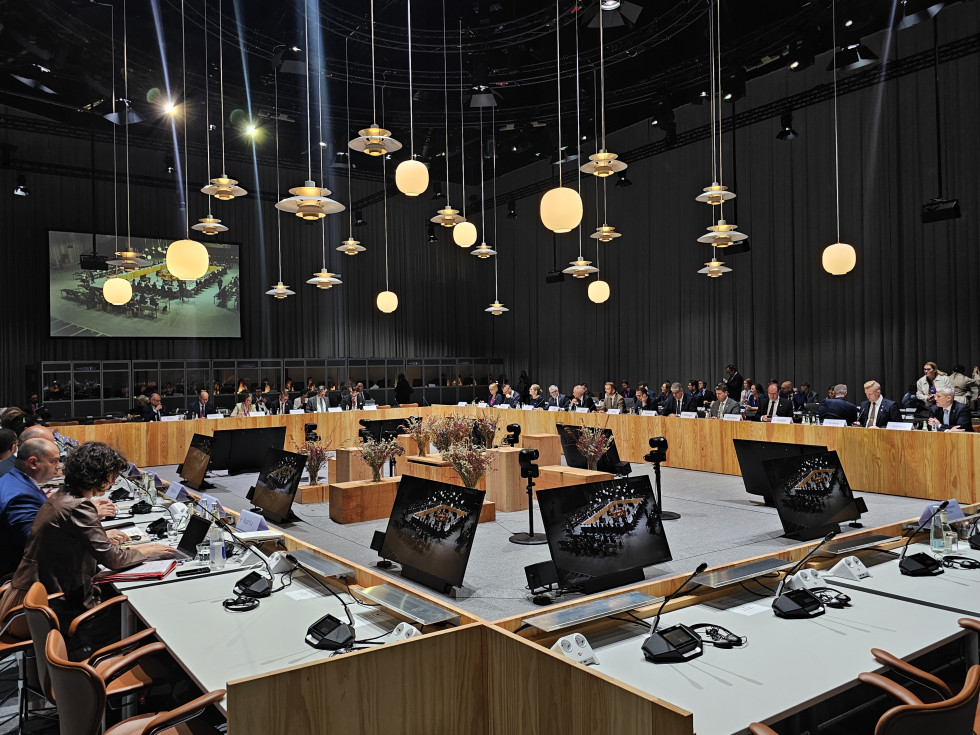EU interior ministers discuss joint responses to the changing security environment
The ministers opened the meeting with an exchange of views, seeking ways to improve civil preparedness, resilience, and crisis prevention in the EU and its member states, in light of the evolving security environment. Their discussions were based on the EU Preparedness Union Strategy. "Slovenia welcomes the Commission's initiatives to improve preparedness, resilience, and response to emerging threats, including the EU Preparedness Union Strategy. This strategy addresses key objectives and areas aimed at ensuring member states are as prepared as possible for future security challenges," said the Minister. He emphasized the importance of improving the efficiency of EU support in the areas of civil protection and related fields: "To increase effectiveness, planning efforts must be streamlined. Procedures should be simplified, common denominators identified, and frameworks developed that meet all requirements equally, avoiding unnecessary overlapping."
In the subsequent sessions, the ministers turned to migration and continued discussions on improving the efficiency of returns for individuals who have no legal right to remain in the EU. They agreed that the main current challenges are insufficient cooperation from third countries and the inadequate legal framework, which hinders the effectiveness of return procedures in member states. They therefore supported the broader use of visa policy and trade cooperation instruments as levers to ensure the cooperation of third countries. Ministers also committed to swiftly concluding negotiations on the proposed Return Regulation presented by the European Commission in March. While there is unified support for strengthening the mandate of Frontex in the area of return, consensus has not yet been reached on establishing return hubs in third countries.
Minister Poklukar underlined that effective migration policy requires active cooperation with third countries on returns, stating: "Slovenia supports integrating return policy into comprehensive partnerships with third countries. The tendency of some third countries to engage only in bilateral arrangements, and their reluctance to conclude EU-level agreements, undermines the EU’s credibility and weakens the position of smaller member states when it comes to successful returns. Therefore, I hope we can adopt a unified external approach." He also agreed that reforming the legal framework is a key step in establishing a common system: "The framework must set clear obligations for foreign nationals to cooperate with national authorities throughout all stages of the return process, as well as the consequences for non-cooperation. This would ensure a deterrent effect and send a clear message that unlawful stay in EU territory will not be tolerated."
During a working lunch, ministers discussed the operationalization of new and innovative solutions in migration management. Slovenia expressed its support for discussions on novel approaches in managing migration that complement the EU Pact and other existing mechanisms. However, new solutions must fully respect EU law and member states’ international obligations concerning fundamental rights.
The Danish Presidency also prioritised the fight against organised crime, with a particular focus on the illicit trade in narcotic drugs. The Danish police presented national experiences in combating organised crime and drug trafficking, including coordinated long-term measures and a transformation plan to tackle the organised cannabis trade in the Christiania district.
Yesterday, prior to the informal Council meeting, the second ministerial meeting of the European Ports Alliance Public Private Partnership took place in Helsingør. Ministers discussed future directions and priorities for the continued operation of the alliance, taking into account current security threats. They highlighted the importance of expanding membership, particularly involving smaller ports, and reaffirmed their commitment to international cooperation, including the urgent need to engage third countries at the beginning of the illicit drug supply chain.
On the sidelines of the meeting, Minister Poklukar held bilateral discussions with fellow interior ministers.

Informal meeting of the EU Justice and Home Affairs Council in Copenhagen | Author Ministry of the Interior

